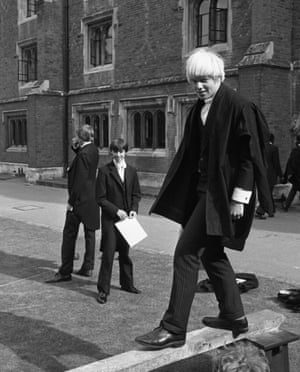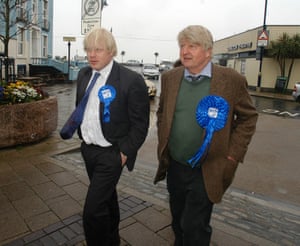On the morning of his election as Tory leader in July 2019, Boris Johnson came down from the stage at the QEII Centre in London and walked towards the members of his family sitting in the front row. There was a kiss for sister, Rachel, and a warm glance for brother Jo, but the handshake offered by father, Stanley, was rebuffed.
“At his moment of supreme triumph, Boris refused his father’s congratulation – a secret reminder that Stanley had ignored his children when he was needed.”
Research suggests that a high proportion of leaders had damaged childhoods. Bereavement or illness, parental divorce, delinquency or addiction are features in the early lives of many senior politicians. The phenomenon has a name: the Phaeton complex.
Few leaders have suffered that complex more completely than Alexander Boris de Pfeffel Johnson. That is the most important and original argument of this biography. Think of the many character flaws that we associate with the prime minister: serial infidelities, narcissistic ambition, a desperation for adulation, reckless gambles, broken promises and betrayed colleagues. The essential source of it all, contends Tom Bower, is a traumatised childhood.
The son is the product of the sins of the father. Stanley Johnson was a feckless and self-obsessed dad and an unfaithful and violent husband, according to this book. The young Boris was enduringly scarred by the deeply troubled marriage between his father and the artist Charlotte Wahl. In 1974, when her oldest son was aged 10, she suffered a nervous breakdown and was admitted to the Maudsley hospital in south London, a specialist unit in mental health care. Bower quotes Charlotte as saying: “The doctors at the Maudsley spoke to Stanley about his abuse of me. He had hit me. He hit me many times, over many years.” She attributes her son’s childhood obsession with becoming “world king” to a desire to “make himself unhurtable, invincible, somehow safe from the pains of your mother disappearing for eight months”.
Allegra Mostyn-Owen, his first wife, and Marina Wheeler, his much-betrayed second wife, both think the son’s serial infidelity was a trait inherited from the father. Bower tells us that Marina believes “the symmetry of Boris and Stanley, the son as the mirror image of his father, could never be broken”.

Johnson senior, himself the son of a miserly, wife-beating, alcoholic, serial adulterer, disputes the version of events related by Charlotte. There’s no denying that Stanley did travel abroad a lot to satisfy an unrequited yearning for fame and fortune. Global overpopulation became one of his causes. He produced Life Without Birth, a polemic denouncing the lack of birth control. Bower does not do humour, so he does not crack the obvious joke that Dad’s enthusiasm for curbing procreation was one trait that did not rub off on the son.
While Stanley was off for a year on one of his adventures, Charlotte was left to fend for herself with three small children in a dilapidated house on Exmoor, where rubbish was strewn around the home and the water was contaminated by the lead piping. When Stanley was around, he encouraged a frantic competitiveness in his children by pitting them against each other. After Rachel beat Boris at table tennis, he kicked the garage door so hard he broke his toe. Years later, when Jo became head of David Cameron’s policy unit at Number 10, Boris remarked: “A little piece of me dies, but otherwise I rejoice in his success.”
For Bower, a painful, chaotic and fractured childhood explains Johnson’s ambition, exhibitionism, secretiveness, unreliability, vulnerabilities and resilience. “Boris agonised over his mother’s fate. Not only had he watched his mother suffer from being regularly hit, but he also saw his father blatantly deny the truth. Unwilling to confide in others about his father’s violence, he became a loner… To mask the misery and hurt, he demanded attention.” The advantage of this as a biographical framing device is that it offers an apparently logical explanation for his subject’s frequently appalling behaviour as an adult. The flaw in assigning all the culpability to Stanley is that it gifts Boris a gold-plated alibi. We should not, it suggests, think too badly of him when he betrays a wife, concocts fabrications or stumbles from debacle to disaster through a public health crisis. We should think of him as the victim of that troubled childhood.
That is not the only way in which this book is extremely generous to its subject. Bower made his name as a biographer with impressively brave exposés of business figures such as Robert Maxwell, Conrad Black and Mohamed Al Fayed. He gave the title Broken Vows to an attempted hatchet job on Tony Blair and Dangerous Hero to a damnatory biography of Jeremy Corbyn. Yet the fearsome investigative author puts away his knuckledusters and slides on kid gloves for “Boris”, as he fondly calls his subject throughout a text in which every other politician is referred to by surname.

The many scandals, scrapes and mistresses are here – they could hardly be ignored – yet Bower applies a softening gloss even to the most ugly examples of Johnson’s behaviour. All those affairs? His childhood had left him unable to forge trusting relationships with men, so Johnson sought out soulmates among women, the author contends. A simpler explanation may occur to you. He likes to shag a lot and doesn’t care who is hurt by his selfishness. Marina finally couldn’t take his infidelities any more and ended their marriage after Carrie Symonds became his mistress. Bower comments lightly: “After Marina had forgiven his affairs with Petronella Wyatt, Anna Fazackerley and Helen Macintyre (plus child), Boris might have considered the consequences for Marina and their four children once his latest affair was exposed.” “Might have considered”? You can think of a more pungent way of putting it. The children, who boycotted a family gathering at Chequers after Johnson became prime minister, certainly can.
Indulgent of his priapic private life, Bower is usually to be found in Johnson’s corner for the many conflicts of his public life. Michael Howard, who sacked Johnson from the Tory frontbench for telling bare-faced lies about his affair with Petronella Wyatt, is “impetuous and blinkered”. In the battles over Brexit between Theresa May and Johnson, it is she, rather than he, who Bower condemns as “duplicitous” and an “opportunist”.
This becomes particularly obvious when the topic is Brexit. Writing about the 2016 referendum, he acknowledges that Johnson campaigned from a bus with a false slogan, but demurely declines to call it mendacious, an accusation he tosses about a lot when talking about Johnson’s political rivals.
Few regard his calamity-studded stint as foreign secretary as his finest hour. Yet his myriad gaffes and blunders are excused on the grounds that he had been “set up” to fail by May and was then let down by “recalcitrant Foreign Office mandarins”. The author blames civil servants for thwarting a Johnsonian wheeze to buy an island in the Arctic Ocean from Norway to turn it into a spy base. Others may think it never happened because it was one of Johnson’s many fantasy projects.
The apologias continue once he becomes prime minister. When his attempt to shut down parliament in 2019 is ruled unlawful by the supreme court, the villain of Bowers’s account is the court’s president, Brenda Hale, “who had rarely concealed her contempt for Boris” and was animated by “her determination to slap down the government”. This suggests that the Tory leader had been confounded by one outrageously biased woman, rather than condemned by the unanimous verdict of all 11 of the country’s most senior judges.
During two chunky concluding chapters about the coronavirus crisis, Johnson vanishes from the text for long stretches as the author unleashes a litany of attacks on the government’s scientific advisers, Public Health England, the Department of Health and the cabinet secretary. Some of this criticism may have merit, but it leaves the question: who was the prime minister and what was he doing when so many institutions of the state were apparently failing in the middle of the gravest public health emergency in more than a century? Dominic Cummings’s rule-busting excursions during the lockdown are discussed sympathetically and without analysis of the disastrous impact on public trust. Bower agrees with those of us who have long observed that the cabinet is thin on talent, but is very lenient about the prime minister’s need to surround himself with duds and stooges.
Charles Moore, his former boss at the Daily Telegraph and briefly his candidate to be the next chairman of the BBC, sometimes refers to Johnson as “the greased albino piglet”. A biography of this length needs to get a grip on the slippery porcine and answer the question: who is the authentic Boris Johnson? Is it the mayor Johnson who was broadly aligned with a liberal, cosmopolitan idea of Toryism during his eight years as the political face of the capital? Is it the Brexiter Johnson who fanned xenophobia to win the referendum? Is it the “Brexity Hezza” he told the cabinet he’d be after he won the 2019 election? I put down this biography with a better idea of the inner demons that drive the prime minister, but little the wiser about whether he has any convictions, other than the many for traffic offences. Even an admiring biographer can find no serious answer to the charge that Borisology amounts to nothing more than his narrow-eyed, ever-fluxing, always-cynical calculations about what he thinks will serve his interests and satisfy his appetites from one day to the next. Who is to blame for that? In the Bower version, it won’t be Boris.
• Andrew Rawnsley is Chief Political Commentator of the Observer
• Boris Johnson: The Gambler by Tom Bower is published by WH Allen (£20). To order a copy go to guardianbookshop.com. Delivery charges may apply